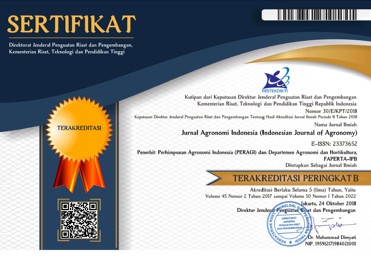Pengarub Pemberian Kompos Gulma Somber Hara NPK Terbadap Tanaman Padi di Laban Sulfat Masam
Abstract
Problem of weeds in tidal swamps land is very important, because weed grows very fast and fertile, have resulted around 1.85-2.76 t/ha dry matter biomass and decreased of rice yield. Biomass recycling as organic matter to soil could be supplied of nutrients for plant. The research of weeds compost application as NPK source have conducted at dry season 2001 in acid sulphate land in Balandean Instalation. The experiment design is randomized block design with 6 treatments and 4 replications. The research results, that weeds compost application as NPK source are not significantly effect for rice growth, nevertheless based on increased of compost dosage applied the rice growth become best. The high yield have found 4.88 t/ha by NPK applied and significantly different compared to rice yield that found by weeds compost application. The effect of weeds compost dosagef or yield is not significantly different, but have found the linier relation between weeds compost dosage with rice yield by the equation: Y = 2.985 + 0.20X with R2 = 0.88 .
Key words: Rice, Compost, Acid sulphate












